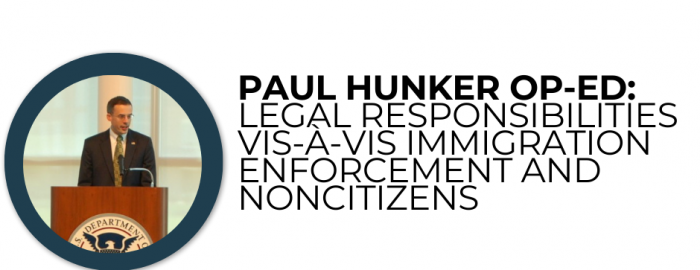After Boston’s mayor announced her refusal to cooperate with ICE’s deportation efforts, Tom Homan, the soon-to-be border czar under President Trump, criticized her decision as “not very smart” and suggested she should “get the hell out of the way.” Homan warned her about 8 U.S.C. § 1324, a provision of federal law that prohibits alien smuggling, harboring, and shielding from detection.
Given the enhanced immigration enforcement of the Trump Administration, municipalities and other organizations are rightly concerned about their legal responsibilities vis-à-vis immigration enforcement and noncitizens.
Municipalities are often as identified as “sanctuary cities” when they will not comply with requests from ICE to assume custody of noncitizens (known as detainers) in local custody. Such detainer requests are voluntary. Declining to cooperate with a detainer does not constitute harboring or shielding noncitizens from detection.
Detainers are controversial as they purport to authorize a local law enforcement entity (LEO) to detain noncitizens for a short period of time on behalf of ICE, even after the noncitizen is ordered released from local custody. Some courts, notably the Fifth Circuit (City of El Cenizo v. Texas, 890 F. 3d 164 (5th Cir. 2018)), have upheld the facial legality of detainers.
I expect in the next four years we will see the Supreme Court address the legality of ICE detainers. What authority does a detainer really give a local LEO to restrain the liberty of a defendant when a state judge has released that person? Is an administrative arrest warrant (not signed by a federal judge but by an ICE deportation officer) sufficient to do so? It appears to be in the Fifth Circuit, but other courts may disagree.
As Homan alluded to, entities may be in legal jeopardy to the extent the U.S. Government believes they are otherwise harboring or shielding noncitizens from detection. (Although ICE has acknowledged that merely not cooperating with ICE detainers is not illegal). United States Attorneys appointed by President Trump may be quite willing to bring such charges.
It will be important for organizations and individuals to understand well their legal responsibilities vis-à-vis noncitizens they interact with or encounter.
Paul Hunker, is an immigration attorney based out of Dallas, Texas and partner at DMCA, LLP. Prior to joining DMCA he spent his entire legal career representing the former U.S. Immigration and Naturalization Service (INS), and U.S. Immigration and Customs Enforcement (ICE). He served as the Chief Counsel for U.S. Immigration and Customs Enforcement, Department of Homeland Security, Dallas Office of the Principal Legal Advisor (OPLA).





Follow us on Facebook